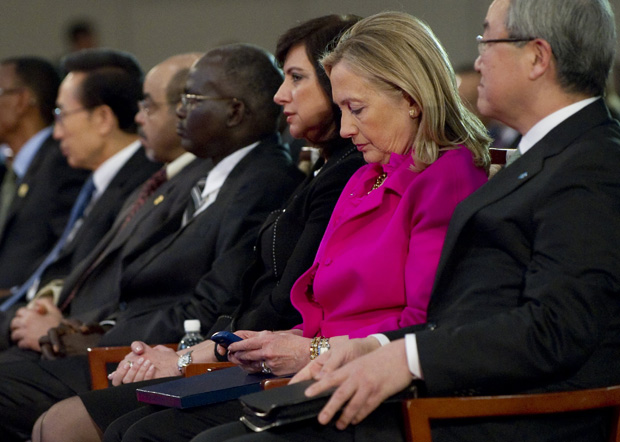Diane’s farewell message
After 52 years at WAMU, Diane Rehm says goodbye.

This 2011 file photo shows Secretary of State Hillary Clinton checks her Blackberry phone alongside Korean Foreign Minister Kim Sung-hwan (R) as she attends the Fourth High Level Forum on Aid Effectiveness in Busan, Korea.
The U.S. economy adds 295,000 jobs in February, prompting questions about when the Federal Reserve might raise interest rates. Attorney General Eric Holder calls on Ferguson leaders to act against widespread racial bias found in its law enforcement. The State Department cautions that its review of Hillary Clinton’s emails could take months. Israeli Prime Minister Netanyahu’s speech to congress stirs political tensions. President Barack Obama signs a long-stalled bill to fund the Department of Homeland Security. And questions remain about whether Obamacare will survive its second trip to the Supreme Court. A panel of journalists joins Diane for analysis of the week’s top national news stories.
With the media frenzy around Hillary Clinton’s use of private emails during her time as U.S. secretary of state, one caller on our March 6 show asked: Will this really have an impact outside of Washington?
Voters may not know the details of the State Department investigation, but the dead air around Clinton’s possible 2016 campaign, which she has not formally announced, is now being filled with noise about her emails — which isn’t a positive way to fill absent messaging, Politico‘s Manu Raju said.
After 52 years at WAMU, Diane Rehm says goodbye.
Diane takes the mic one last time at WAMU. She talks to Susan Page of USA Today about Trump’s first hundred days – and what they say about the next hundred.
Maryland Congressman Jamie Raskin was first elected to the House in 2016, just as Donald Trump ascended to the presidency for the first time. Since then, few Democrats have worked as…
Can the courts act as a check on the Trump administration’s power? CNN chief Supreme Court analyst Joan Biskupic on how the clash over deportations is testing the judiciary.